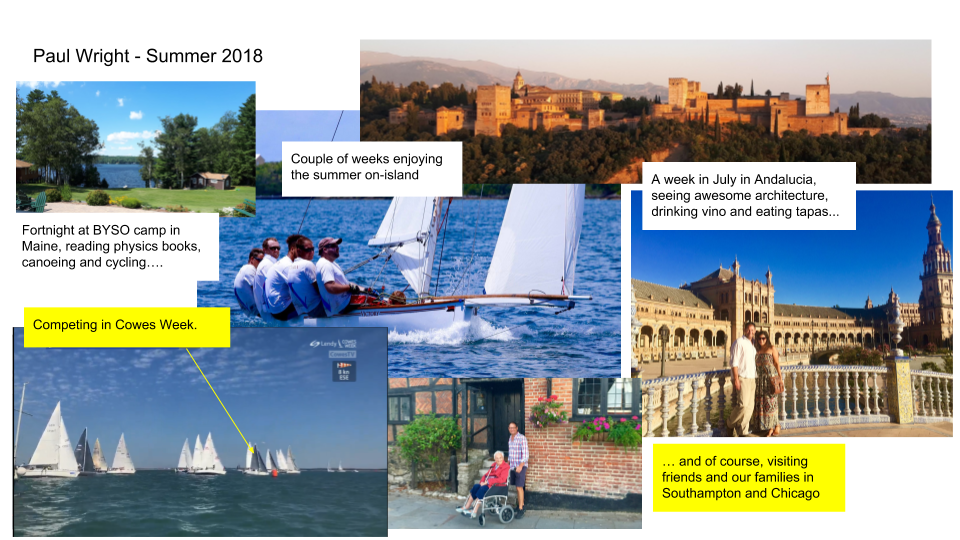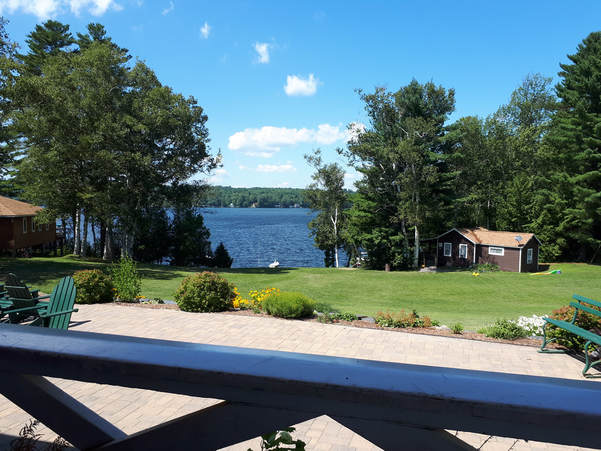|
The last two weeks of summer vacation are usually spent at BYSO (Boston Youth Symphony Orchestras) camp in the middle-of-nowhere Maine. This is because my wife runs the cello coaching and chamber music department of BYSO. She has been coming to this camp for nearly 20 years. This is my third year here. It is kind of relaxing, which is not my idea of a holiday but we get a nice cabin by the lake, free food at the lodge and the weather is generally nice, although can be chilly in the evenings. I tend to use the time to cycle a lot around the neighbouring countryside, read and work on the website or booklets for the coming year. Last year, we spent most of July on-island so I completely redid all the IGCSE work booklets then, and so I think that they only need a little tweaking in September. The website on the other hand still has a couple of glaring gaps - mostly AP-2, which I didn't teach last year. So I am working on them.
Have also been forcing myself to use the Google apps for new slides and worksheets. Converting existing word files to Docs is a waste of time as the formatting goes to pieces, but all new material will be done online. Why? Well, I am fast realising that the cloud-based approach is likely to the future of educational computing. Chromebooks are significantly cheaper and easier for students and the IT department to manage and it will just be a matter of time before Saltus converts. The majority of state schools in the US and the UK are on Chrome. The fiasco that we had last term after the IT dept discovered that most of the students and staff had been downloading VPNs and other dodgy software on their laptops was something to behold. Almost every student and staff had their computers ghosted! Not me though.... There are a couple of downsides to Chromebooks though, which may be addressed in future years: 1) The lack of physics software applications such as data loggers and trackers. 2) Difficulties in printing and the poor quality of PDF conversions of documents, 3) difficulties in converting existing MS Office files. Advantages are that as soon as someone logs on to the chromebook, it instantly remembers everything that you have done and that they are easily replaceable and almost student-proof. The inability to download software prevents nasty viruses etc (which our IT dept go nuts about). I am unsure what the wide-ranging implications of Mr Google running our lives though. Big Brother? If the Google hard drive (wherever that is?) gets hacked or corrupted? So - impressions? Docs, Slides and Sheets are a bit clumsier than MS Office and the quality is not as high - but for education, do we really need that? I seem to be getting the hang of it in a classroom-functional way at least. Reading the book that Deryn (head) set us for the vacation. 'Ethics of Excellence'. The main thrust of his argument is that good schools are created when there is a supportive and positive attitude and ethos surrounding the school - parents, management, staff and the community. If this happens then the students feel a sense of value and their morale and motivation increase. Well - no s**t Sherlock as the expression goes. The book is very simply written and aimed at Middle School level. Having worked or been involved in a variety of schools, this has been obvious to me from the very beginning. Hamble School where I went to (as my parents were broke) was truly awful - and STILL IS! The school that I started teaching in was also. Poorly regarded in the town and hated by majority of the students and staff. Saltus on the other hand has a long history of supportive parents and interested parties throughout the island. We do (of course) have our moments and issues, but that will always be the case, however the general ethos is positive and the majority of students feel that they are getting value from their education. The one complaint that almost every parent has is that the fees are TOO HIGH. They go up by 5-6% per year but the average staff pay rise has been less than 1% for the past 10 years. We do have a reasonably high staff turnover in the secondary department, but that is the nature of expat life and the island's immigration system, especially where there is little or no opportunity for advancement. Next term, we are having meetings and discussions about a number of topics. The one that is likely to have a major effect on me is 1) changing to a middle/high school and separating staff (current most teach both levels) and 2) changing to the North American system. This could mean that I will be out of a job by June 2019..... which I am not happy about... Anyway, rehearsals are coming to an end so signing off for now. |
AuthorPhysics and Science teacher at Saltus Grammar School, Bermuda - also a sailor! Archives
August 2018
Categories |
| Island Physics | random ramblings |


 RSS Feed
RSS Feed